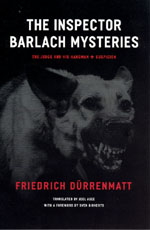Review: Dürrenmatt, The Inspector Barlach Mysteries
 In the December 22 & 29 edition of the Times Literary Supplement Ian Brunskill’s review of Dürrenmatt’s The Inspector Barlach Mysteries: The Judge and His Hangman and Suspicion begins:
In the December 22 & 29 edition of the Times Literary Supplement Ian Brunskill’s review of Dürrenmatt’s The Inspector Barlach Mysteries: The Judge and His Hangman and Suspicion begins:
The more well-ordered a world (or narrative) appears to be, the greater the potential for devastation …. [And] that, to a large extent, is what drew Dürrenmatt in the 1950s to the traditionally disciplined realm of crime fiction, the conventions and formulas of which he proceeded, with some relish, to turn upside down. The resulting short novels have long been among his most popular works. Now wonderfully translated by Joel Agee, they are part of the University of Chicago Press’s promotion of the author.
And indeed with these translations of The Inspector Barlach Mysteries the Press has done its best to reinvigorate interest in Dürrenmatt’s atypical crime stories. Both of the mysteries in this book make a radical departure from convention as they follow Inspector Barlach through worlds in which the distinction between crime and justice seems to have vanished. In The Judge and His Hangman, Barlach forgoes the arrest of a murderer in order to manipulate him into killing another, more elusive criminal. And in Suspicion, Barlach pursues a former Nazi doctor by checking into his clinic with the hope of forcing him to reveal himself. The result is two thrillers that bring existential philosophy and the detective genre into an unusual convergence.
The Press has also recently released a collection of Dürrenmatt’s Selected Writings. See our Dürrenmatt webage to find out more.